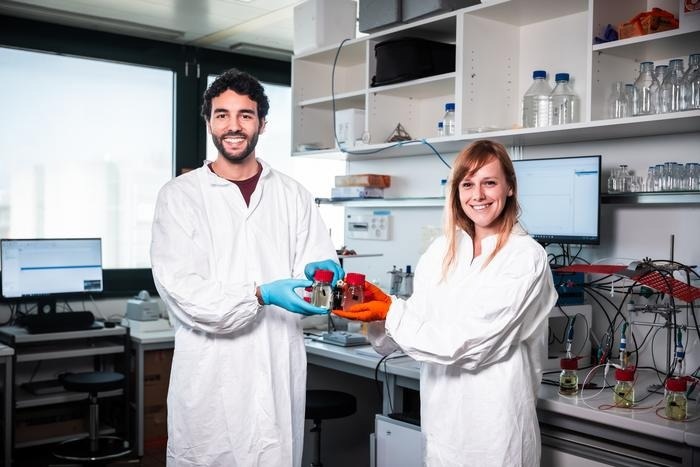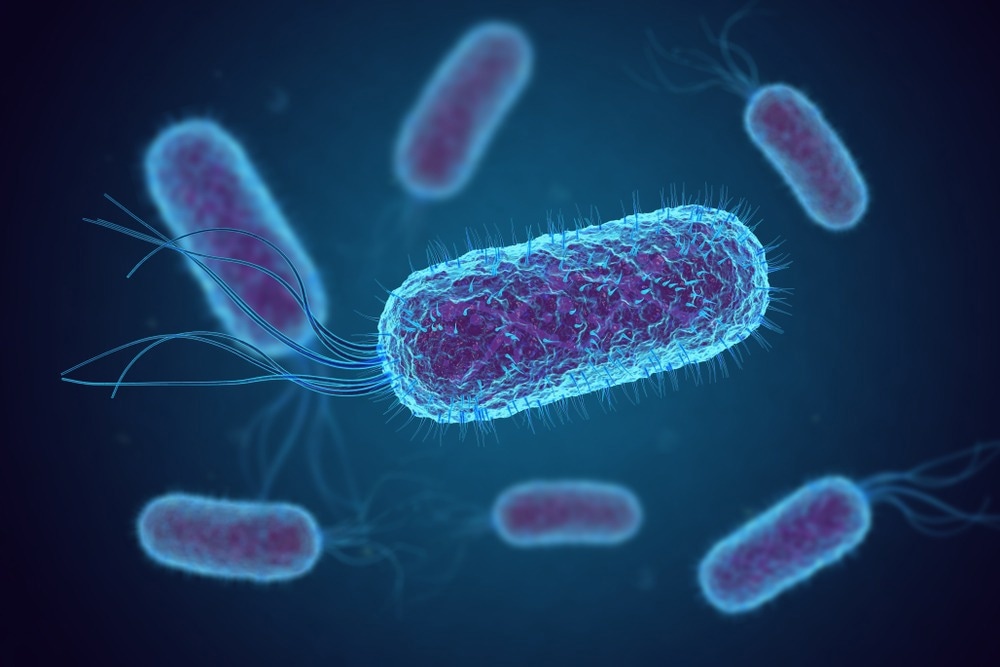Reviewed by Danielle Ellis, B.Sc.Sep 11 2023
The EPFL team of Ardemis Boghossian reports a ground-breaking development in bioelectronics, enhancing the capacity of ordinary E. coli bacteria to produce energy, in a study that was published in the journal Joule. The study described a cutting-edge strategy that might change both energy generation and waste management.
 Mohammed Mouhib and Melania Reggente, the study’s lead scientists, posing at their lab at EPFL. Image Credit: Jamani Caillet (EPFL)
Mohammed Mouhib and Melania Reggente, the study’s lead scientists, posing at their lab at EPFL. Image Credit: Jamani Caillet (EPFL)
We engineered E. coli bacteria, the most widely studied microbe, to generate electricity. Though there are exotic microbes that naturally produce electricity, they can only do so in the presence of specific chemicals. E. coli can grow on a wide range of sources, which allowed us to produce electricity in a wide range of environments, including from waste water.”
Ardemis Boghossian, Professor, EPFL
Extracellular electron transfer (EET), a key component of biological research, has been used to harness the power of E. coli bacteria to generate energy. E. coli bacteria were modified by EPFL researchers to demonstrate improved EET, transforming them into powerful “electric microbes.” The bioengineered E. coli can generate energy while metabolizing a range of organic substrates, in contrast to earlier techniques that required certain substrates.
The development of a fully functional EET route inside E. coli, a feat never before accomplished, is one of the study’s major breakthroughs. The researchers successfully built an optimal route that bridges the inner and outer membranes of the cell by incorporating components from Shewanella oneidensis MR-1, a bacterium famous for producing electricity. In comparison to traditional procedures, this innovative pathway outperformed earlier partial efforts and resulted in a three-fold increase in electrical current production.
Wastewater as a Playground
Significantly, the modified E. coli performed admirably in a variety of settings, including wastewater gathered from a brewery. Modified E. coli flourished while exotic electric microbes struggled, demonstrating its potential for massive waste treatment and energy production.

Image Credit: fusebulb/Shutterstock.com
Boghossian added, “Instead of putting energy into the system to process organic waste, we are producing electricity while processing organic waste at the same time–hitting two birds with one stone. We even tested our technology directly on wastewater that we collected from Les Brasseurs, a local brewery in Lausanne. The exotic electric microbes were not even able to survive, whereas our bioengineered electric bacteria were able to flourish exponentially by feeding off this waste.”
The study’s consequences go beyond waste management. The modified E. coli can be used in microbial fuel cells, electrosynthesis, and biosensing, to name a few applications, due to its ability to produce electricity from a variety of sources. The bacterium’s genetic flexibility also makes it possible to customize it to adapt to certain habitats and feedstocks, making it a useful tool for the advancement of sustainable technologies.
Our work is quite timely, as engineered bioelectric microbes are pushing the boundaries in more and more real-world applications. We have set a new record compared to the previous state-of-the-art, which relied only on a partial pathway, and compared to the microbe that was used in one of the biggest papers recently published in the field. With all the current research efforts in the field, we are excited about the future of bioelectric bacteria, and can’t wait for us and others to push this technology into new scales.”
Mohammed Mouhib, Study Lead Author, EPFL
Source:
Journal reference:
Mouhib, M., et al. (2023). Extracellular electron transfer pathways to enhance the electroactivity of modified Escherichia coli. Joule. doi.org/10.1016/j.joule.2023.08.006